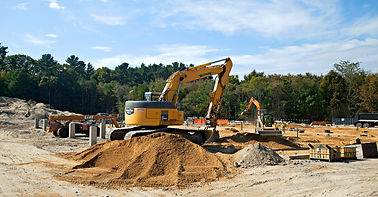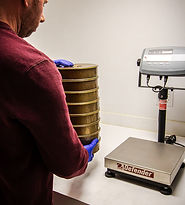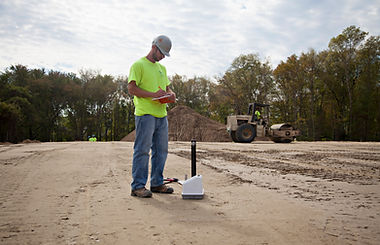
Engineering with Precision & Experience since 1997
Civil Engineers - Land Surveyors - Landscape Architects - Environmental Consultants - Soil/Asphalt/Concrete Testing
Soil Testing Services
Outback Engineering's Soil Testing division provides civil and site related soil testing services for design, permitting work, and consulting services during design and construction. Services include field and laboratory testing related to septic systems, stormwater drainage system design, soil compaction and pavement compaction testing. Outback has DEP-certified Soil Evaluators and qualified engineers capable of observing site and roadway construction practices. Our in-house laboratory technicians also perform sieve, hydrometer and Proctor tests.
Title 5 Soil Evaluation: This is an onsite testing procedure required by DEP to determine soil and groundwater conditions for the design and siting of septic systems. The evaluation typically requires the excavation of an open hole to observe soil types, groundwater elevations, and perform a percolation test. In instances where high groundwater conditions persist and a perc test cannot be performed as part of a remedial replacement of a failed septic system, we collect and analyze soil samples according to DEP procedures for Sieve/Hydrometer tests in lieu of perc test. Outback has a number of DEP-certified Soil Evaluators capable of testing all types of soils. With our experienced soil evaluators, we're often successful in obtaining passing perc tests where others have failed testing difficult soils.
Groundwater Determination: This is often done in conjunction with the Title 5 Soil Evaluation, to properly design the elevation of the septic system. Groundwater elevations are important to properly design drainage systems, building foundations, basement elevations, roadways and parking areas, to ensure proper functioning of the systems. Our DEP- certified soil evaluators carefully determine groundwater elevations based on observed water conditions and soil mottling (redoximorphic features) to establish seasonal high groundwater conditions. When necessary, empirical methods such as the Frimpter method are used to calculate the seasonal high groundwater elevation. These high groundwater conditions are used by our engineers in site design to ensure septic and drainage systems function properly, and to keep your home and valuable contents high and dry.
Laboratory Tests: Outback Engineering's in-house lab performs sieve and Proctor tests to ensure compliance of engineered soils during construction of septic systems, drainage systems, roadways and parking areas. Sieve tests are run on soil samples in lieu of perc tests, Title 5 replacement sand, and road gravel according to established laboratory procedures.
Soil Compaction Testing: Soil compaction is a crucial part of the construction process. Ensuring proper compaction of in situ and engineered soils is critical to the long-term performance of roadways and parking areas, as well as proper support for building foundations. Following ASTM and AASHTO standards, we perform field observations and compaction testing using non-nuclear density gauges to ensure compliance with required specifications and quality assurance. Performing Proctor and sieve tests in our lab allows our technicians to properly conduct field compaction tests based on optimum moisture content and the maximum dry density of soils.
Asphalt Pavement Compaction Testing: Similar to the soil compaction test, we use non-nuclear density gauges specifically designed for use on pavement. Our technicians follow behind the asphalt paving machine and rollers to ensure pavement is properly compacted.




